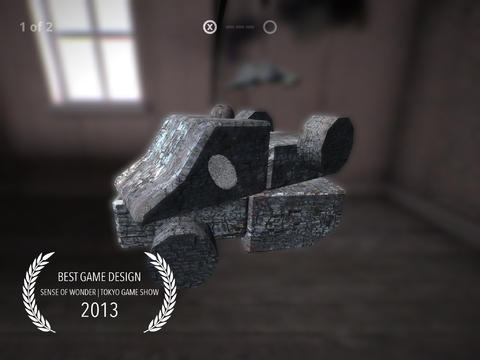Lost Toys Review

- Publisher: Barking Mouse Studio, Inc.
- Genre: Strategy
- Released: 9 Jan, 2014
- Size: 121.3 MB
- Price: $3.99


PROS
- Nice graphical style
- A nice concept for a puzzle game
CONS
- Finicky controls
- Monochrome visual style detracts from the puzzle element of the game
- Grating sound effects and music
VERDICT
While Lost Toys looks lovely, its puzzles are too mechanically flawed to deliver the thoughtful and relaxing challenge the developer was probably aiming for.
- Full Review
- App Store Info
Sooner or later, we are going to have to abandon the idea that wooden toys will be viewed by modern kids as pieces of art. While the sight of our once-beloved spinning top may still tug some sentimental heartstrings, the reality is that - these days at least - plastic and pixels are what kids want.
Perhaps this is what Barking Mice Studio's new puzzle game Lost Toys is commenting upon. Each stage of this block-puzzler presents the charred and blackened husk of a toy, twisted out of shape and in need of repair. To fix the discarded plaything, you must manipulate it like a Rubik's Cube, rotating it this way and that along set number of axis, until its original form has returned.
Sliding your finger over the toy's surface will rotate segments of the object, while swiping the background will spin the whole toy around to give a new angle on the proceedings.
At least, this is how things are meant to work. But – on smaller screens especially – inputs all too often become confused. As a result, we regularly found ourselves staring at the back of an object which we had intended to twist into a new shape.
To compound this problem, the near monochrome appearance of the burnt toys means the desired end shape is not always apparent. On a model police car this doesn't prove too troublesome, but when the final form is less distinct, it becomes a real issue.
In some cases it took us minutes to discover what the geometric shape on screen was even meant to be, let alone how to form it. This frustration is made all the more acute thanks to the grating sound effects, and overly ornate piano soundtrack.
To make matters worse, each level only allows you a set number of twists before you have to reset your attempt. This leads to endless restarts as you attempt to trial-and-error your way towards an answer.
While the puzzles in Lost Toys are visually impressive, they ultimately prove too mechanically flawed to deliver the thoughtful and relaxing challenge the developer was probably aiming for.












 $3.99
$3.99













